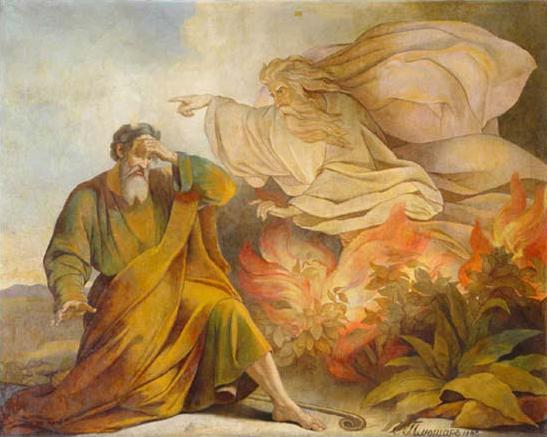
(Wikimedia Commons public domain image)
***
It seems that we now have a pretty firm date for the release of the Interpreter Foundation’s new docudrama, Undaunted: Witnesses of the Book of Mormon: 24 May 2022. In other words, about two months from now. I don’t know the details yet, but I believe that it will be out that day in DVD form and, very possibly, via streaming. (We are not intending a general theatrical release for it.) I’m excited to get this production out, and I hope that it will receive the widest possible circulation.
***
Four new items have appeared on the website of the Interpreter Foundation:
This is the latest generous contribution from Jonn Claybaugh.
Interpreter Radio Show — February 20, 2022
In this episode of the Sunday evening Interpreter Radio Show, Bruce Webster and Kris Fredrickson discussed the responsibility of the Restored Church to fight against evil as well as the use of study Bibles to aid in scripture study. You can listen to or download the 20 February 2022 broadcast of the Interpreter Radio Show at the link that I’ve provided. It has been freed of interruptions, so you won’t have to listen to commercials or to outdated news. The first portion of the show, its first hour, was devoted to a roundtable discussing the upcoming Come Follow Me lesson #14 (Exodus 7–13). The Interpreter Radio Show can be heard every week on Sunday evenings from 7 to 9 PM (MDT), on K-TALK, AM 1640. If you’re outside of the Salt Lake Valley, however, your best option is almost certainly to listen live on the Internet at ktalkmedia.com.
Bruce Webster and Kris Frederickson conducted the Interpreter Radio Roundtable for Come, Follow Me Old Testament Lesson 14, “Remember This Day, in Which Ye Came Out from Egypt” on Exodus 7–13. It has now been extracted from the 20 February 2022 broadcast of the Interpreter Radio Show (on which, see above) — and purified of commercial and other intrusions — for your listening pleasure and edification. The complete show may be heard at https://interpreterfoundation.org/interpreter-radio-show-February-20-2022/. The weekly Interpreter Radio Show can be heard live each and every Sunday evening from 7 to 9 PM (MDT), on K-TALK, AM 1640. You can also listen live on the Internet at ktalkmedia.com.
Nibley Lectures: One Eternal Round — Lesson 1
In 1990, Hugh Nibley presented a series of twelve lectures on Facsimile 2 in the Pearl of Great Price. The lectures occurred almost weekly beginning on June 27, first in the Maeser Building and later in the Joseph Smith Building auditorium. The Interpreter Foundation now makes them available to you at no charge.
***
I laughed at this short piece from the indispensable Jeff Lindsay, but it’s fundamentally serious:
***
From the British astrophysicist and theologian David Wilkinson, God, Time and Stephen Hawking: An Exploration Into Origins (London: Monarch Books, 2001), 166-167 (with some slight improvements in otherwise mysterious punctuation):
Some scientists . . . try to resist any theological interpretation at all costs. An interesting example using aliens and other universes is given in a paper published in the reputable journal The Quarterly Journal of the Royal Astronomical Society by Professor Edward Harrison of the University of Massachusetts.
He says that there are three possible answers as to why the universe is so finely balanced. First, that God designed it, but that answer, he argues, precludes further rational inquiry. Second, the anthropic principle, but he finds this unsatisfactory. His third answer is that our universe was created by life of superior intelligence existing in another physical universe.
How does he get to this extraordinary conclusion? First, he picks up on the above suggestions of black holes as the birthplaces of new universes. Second, he argues that due to the rapid evolution of intelligence (which we currently see in humanity) there is every reason to expect that a time will come in the future when we will be able to design and create our own universes. Thus, the fine-tuning of this universe is to be explained as an engineering project of superior beings. They have created this universe out of a black hole. He calls it a ‘natural creation theory’ and claims that it also explains why the universe is intelligible to us. It is created by minds similar to our own, who designed it to be that way.
There are so many questions to this that one hardly knows where to start! Harrison is a respected cosmologist, but this theory seems quite ludicrous if it is not an elaborate wind-up [American “set-up” or “prank”]! Will we really reach the stage of being able to build new universes? More fundamentally, where did these superior beings come from in the first place?
He criticises belief in God for stopping any further rational inquiry, but then falls into the same trap. What can we possibly know about these ‘superior’ beings in another universe? If he is to be drawn to the conclusion that this universe is designed, is it not simpler to see the ‘superior being’ as God?
Indeed, in contrast to the unknown aliens in another universe, Christians claim that this God, far from being in another universe, has revealed himself in this universe and forms personal relationship with those who open their lives to him. The evidence for the existence of God is much stronger than that for superior beings in another universe.
To say that the theist states ‘God created’ and that this stops further inquiry is naive to the extreme. It was on the basis of belief of a creator God that much of the early scientific revolution was based. Far from stopping questions, belief in God can liberate inquiry.










